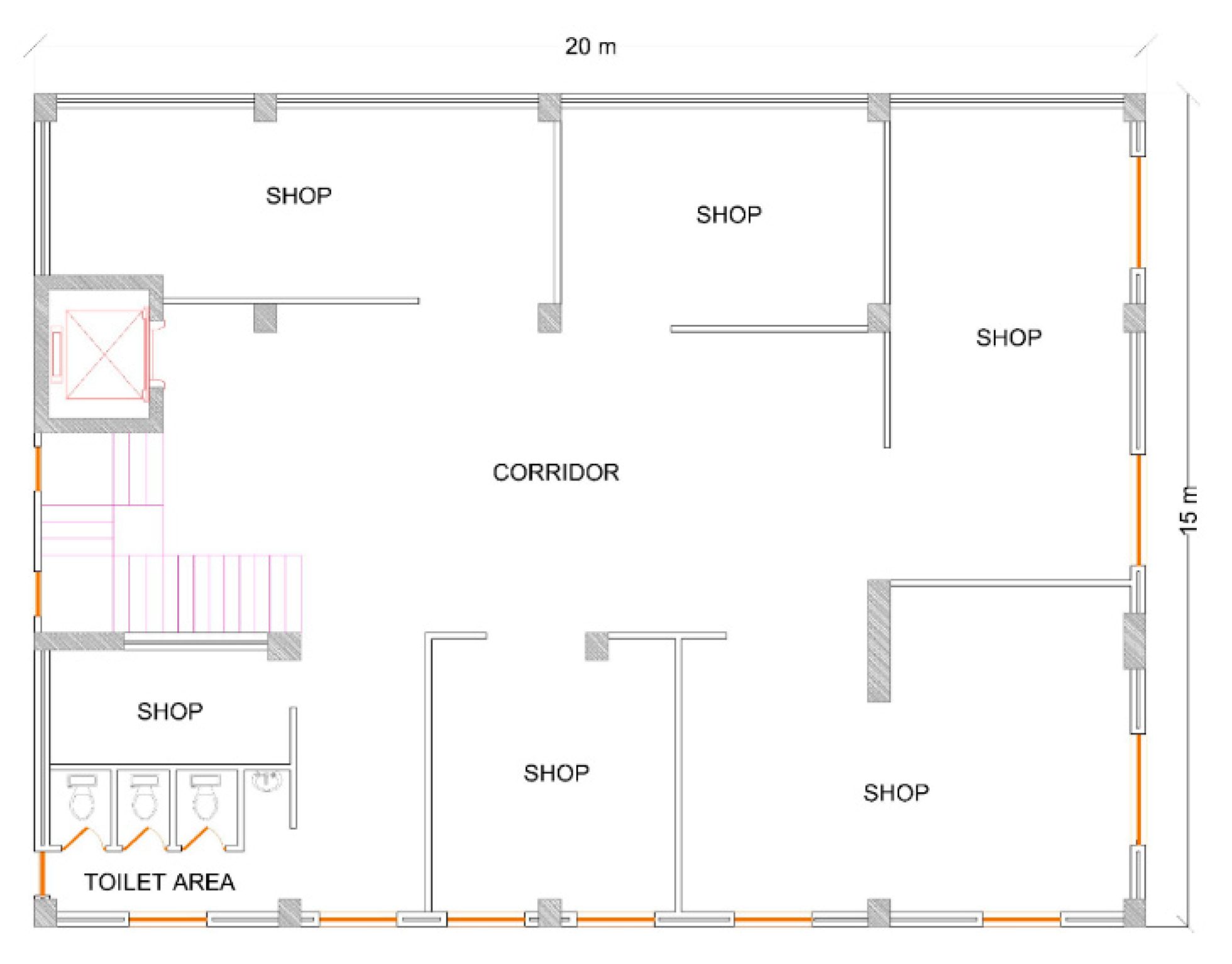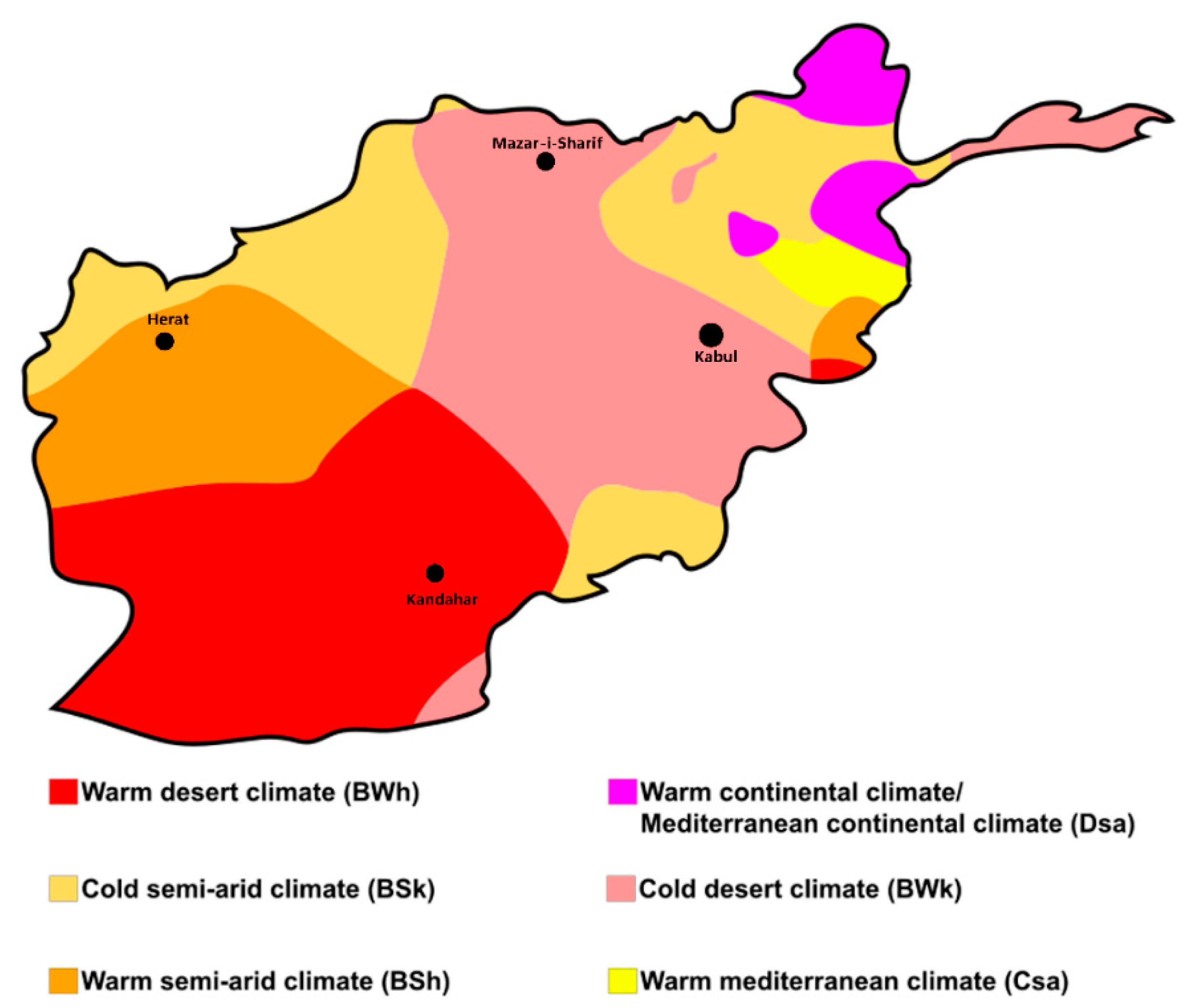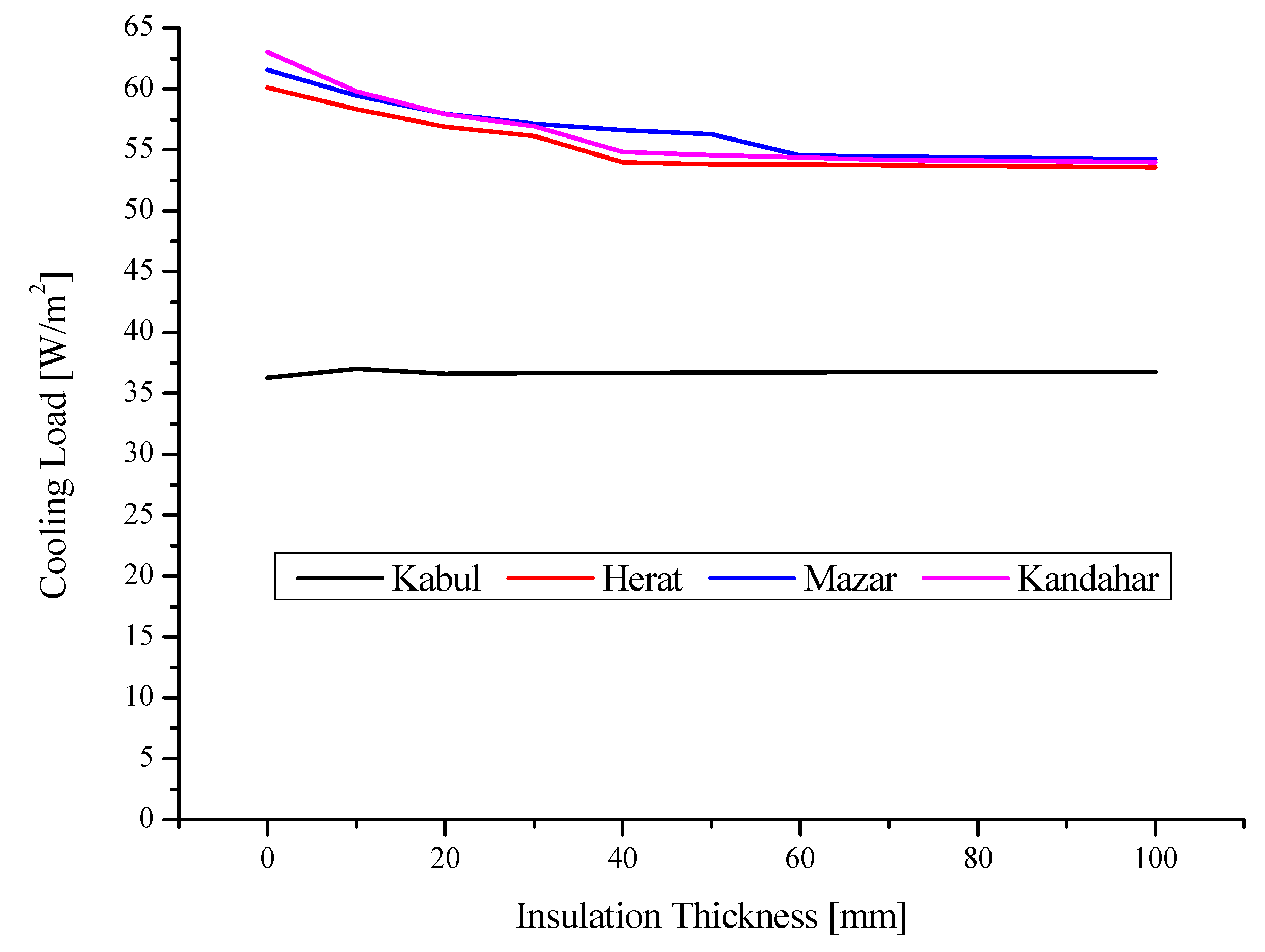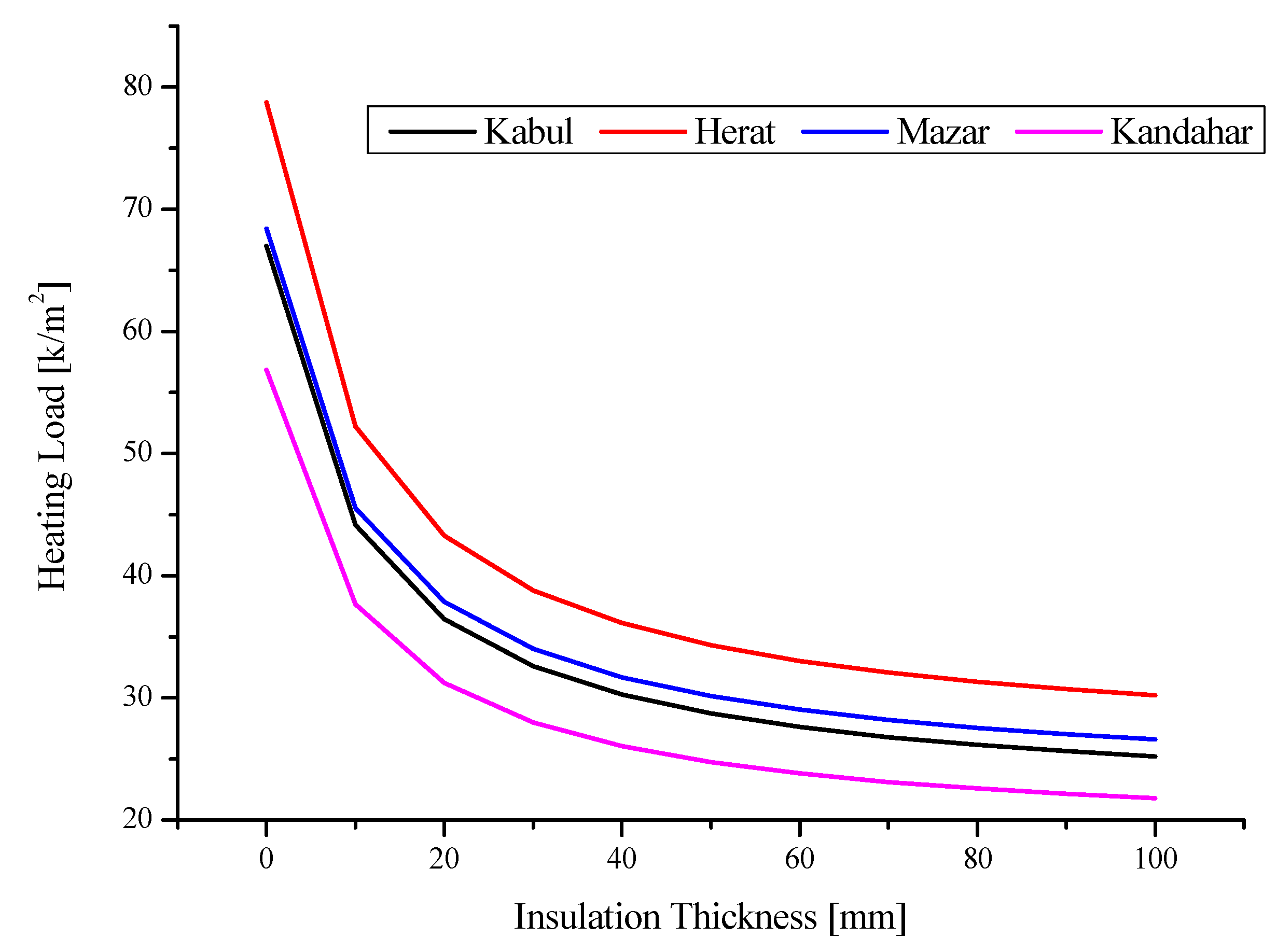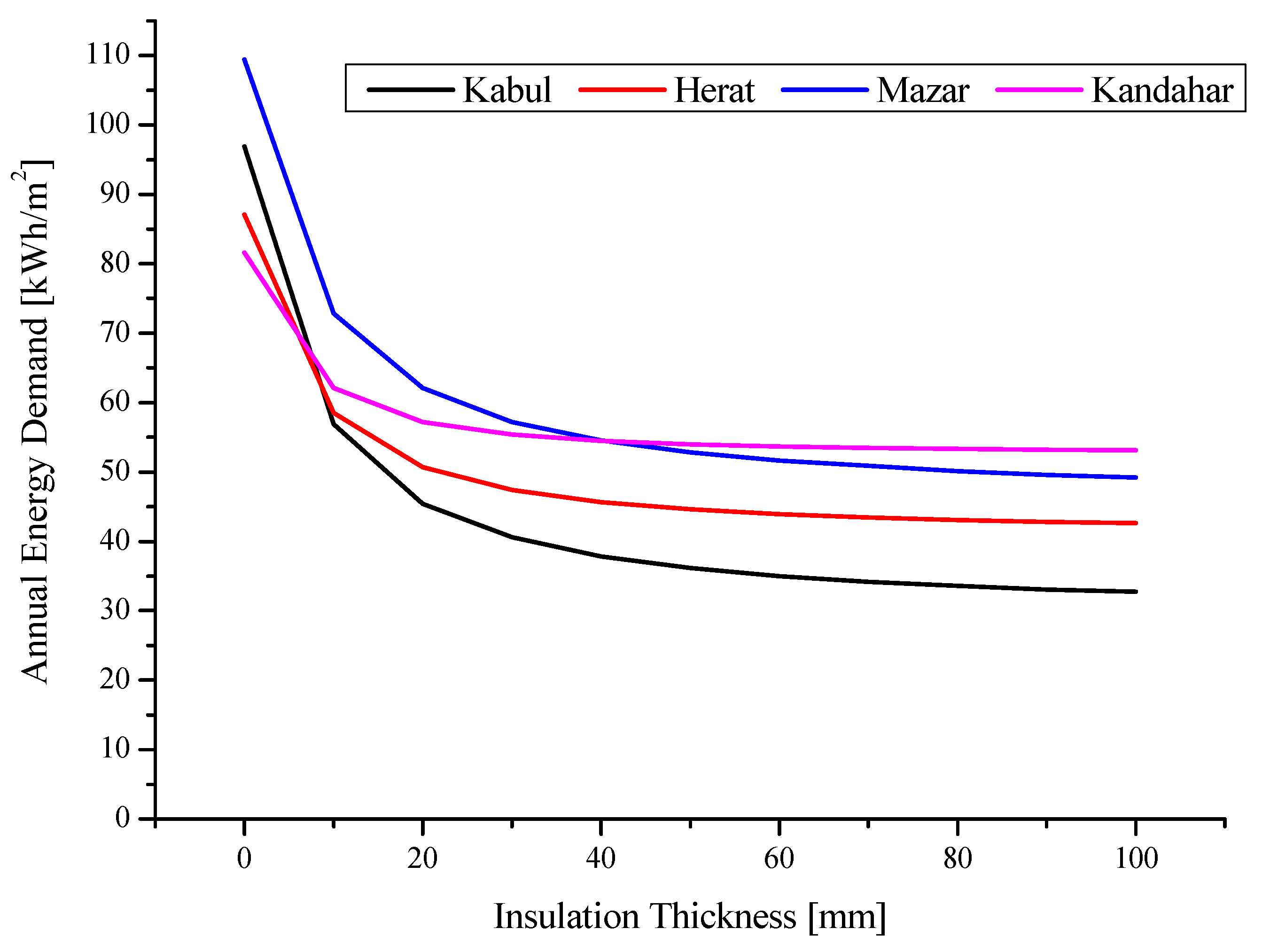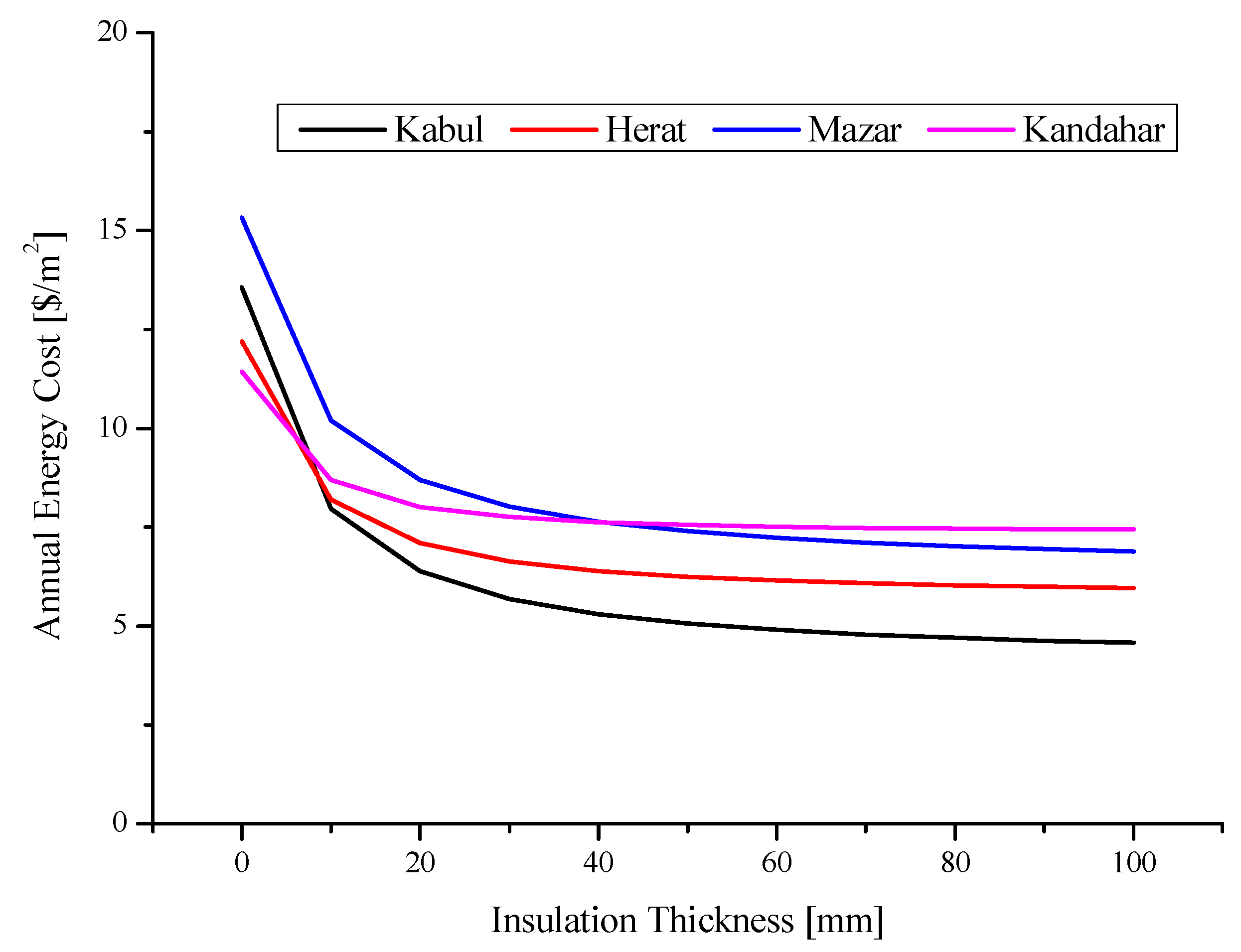1. Introduction
In years there has been a growing focus, on the challenges related to constructing and operating buildings. Concerns about energy consumption, greenhouse gas emissions and resource depletion have prompted increased attention in this area. One important aspect of achieving energy efficiency and sustainability goals in buildings is insulation. Insulation refers to the ability of a buildings envelope to resist heat transfer, playing a role in regulating temperature between the inside and outside environments. By reducing heat transfer insulation helps maintain conditions reduces the need for heating and cooling and ultimately decreases energy usage and carbon emissions. High-rise commercial buildings are features of landscapes worldwide; they serve as economic centers, corporate headquarters and multifunctional spaces. These structures have demands for energy regarding heating, cooling and lighting. Hence, they offer opportunities, for implementing energy saving measures. Considering that 36% of global energy consumption and 37% of energy related carbon dioxide emissions came from the construction and operation of building sector in 2020 [
1]. It is imperative to prioritize sustainable building practices that emphasize energy efficiency and environmental responsibility. Research and innovation efforts are now concentrated on insulating commercial buildings as an essential area of focus.
This research delves into the relationship, between insulation, energy usage and greenhouse gas emissions in commercial buildings with a specific focus on different climate zones. The main goal is to assess how insulation impacts energy efficiency and carbon emissions in real world building scenarios by analyzing data and conducting simulations. By evaluating the effectiveness of insulation in climate contexts this study also contributes to the growing knowledge base on construction practices and provides valuable guidance for architects, builders and policymakers.
Previous studies have widely recognized the significance of insulation in improving energy efficiency. A comprehensive analysis conducted by Aditya et al. explores types of insulation materials and their potential for conserving energy in buildings while emphasizing the role of insulation in reducing heat transfer [
2]. Another study examine how building envelope insulation affects cooling energy consumption during summer months highlighting the advantages of using insulation to reduce energy demands [
3]. Schuchardt et al. also discusses the integration of storage systems within district heating networks, as a means to optimize energy efficiency underscoring the importance of insulation [
4]. Furthermore, various studies have investigated into the energy implications of insulation, in climate regions. Bodalal et al. conducted an analysis on the heating and cooling energy needs of residential buildings across diverse climate zones in Libya, highlighting the importance of customized insulation strategies [
5]. Ahmed examined the impact of insulation on building energy efficiency in Northern Upper Egypt underscoring the significance of insulation in climatic conditions [
6]. Majumder et al. explored the properties of recycled materials for building insulation providing insights into sustainable solutions for insulation [
7].
In relation to Afghanistan Sabory et al. discussed the building industry in Kabul city from a sustainability standpoint shedding light on both challenges and opportunities for sustainable construction practices, in that area [
8]. It is crucial to comprehend Afghanistan zones for our research purposes as this landlocked country encompasses arid, semi-arid and mountainous regions [
9]. Kabul, being the capital and largest city experiences arid climate conditions characterized by cold winters and hot summers [
10]. Kandahar, the city, in Afghanistan experiences clear winters and long hot dry summers [
11]. On the hand Mazar e Sharif, situated in the region of the country has cold and wet winters along with hot and arid summers [
12]. These varying climate conditions make Afghanistan an excellent case study for evaluating how insulation affects energy efficiency in buildings across different climates. The country’s rapid urbanization and the challenges presented by construction practices highlight the need to address energy efficiency in building design and operation [
8].
In our research project we utilize building energy simulation software called the Hourly Analysis Program (HAP) to conduct simulations and analyses of energy consumption as well as greenhouse gas emissions in a typical high-rise commercial building. By considering factors like insulation thickness, climate zone variations and building characteristics. Our goal is to provide an assessment of how insulation impacts energy efficiency and sustainability. Additionally, we explore aspects, future research directions and broader implications for construction practices, in various global contexts. Through this research endeavor we contribute to efforts aimed at promoting energy building design while minimizing the environmental impact of high-rise commercial buildings.
In conclusion, the research demonstrates substantial benefits, including up to a 62.7% reduction in energy consumption, approximately 36.0% reduction in CO2 emissions, and impressive cost savings of around 63.0%, underscoring the efficacy of insulation in enhancing sustainability and efficiency in high-rise commercial buildings across diverse climate zones.
2. Materials and Methods
In this section, we outline the methodological approach employed to investigate the impact of insulation on energy consumption and greenhouse gas emissions in high-rise commercial buildings situated in diverse climate zones. The methodology encompasses a multi-faceted process designed to comprehensively address our research objectives.
2.1. Data Collection and Building Characterization
We initiated our research by gathering comprehensive data pertaining to a representative high-rise commercial building. This involved meticulous documentation of architectural and construction specifications. Additionally, historical weather data for four distinct climate zones, namely Kabul city, Herat city, Mazar city, and Kandahar city, was collected to represent a spectrum of environmental conditions. Data on existing energy usage patterns and insulation levels within the selected building were also recorded. Simulations were conducted using a high-rise commercial building spanning 300 square meters in floor area. This structure featured four vertical walls, 120 windows, and an insulated foundation. The walls were constructed with two layers of common brick, each measuring 150mm in thickness, and they were plastered on the inside while being finished with 20-mm thick mortar on the outside. This assembly resulted in an effective R-value of 0.49 m²K/W for the entire wall system. The roof, on the other hand, consisted of six layers: a 20-mm plaster layer, a 150-mm concrete slab, a 150-mm batt insulation layer, a 30-mm PCC layer, a 3-mm asphalt roll layer, and a 70-mm RCC layer, providing an overall R-value of 5.01 m²K/W and being waterproofed with an asphalt roll.
Figure 1.
Architectural 2D plan for the examined building.
Figure 1.
Architectural 2D plan for the examined building.
Table 1 lists the characteristics of the building.
Table 2 provides information on various building materials, including common brick, plaster, concrete, wall insulation, and roof insulation, specifying their thickness, thermal resistance, density, and weight.
2.2. Climate Adaption Analysis
Recognizing the importance of climate change resilience, we developed a climate adaptation framework. This framework integrated long-term climate projections for the selected regions and utilized climate data modeling to predict future climate conditions. We assessed the resilience of insulation strategies by analyzing their effectiveness under various future climate scenarios. Due to the substantial amount of mountainous and arid area, Afghanistan has significant climatic differences. So that it may be examined more accurately, it has been divided into arid, semi-arid and mountainous climate zones [
13]. Four representative and most developed cities are examined in this research. They are Kandahar, Herat, Mazar, and Kabul.
Figure 2 shows the chosen cities and climate zone map for the Afghanistan.
The classification map of Afghanistan’s climate reveals a diverse pattern of zones, within this landlocked country. In the lowlands of the southwest a considerable portion of Afghanistan experiences a desert climate, characterized by scorching summers with temperatures often exceeding 40°C and limited rainfall. As we move towards the east the climate gradually shifts into an arid zone where temperatures are milder ranging from 20°C to 30°C during summer months while rainfall remains scarce. However, what stands out most on Afghanistan’s climate map is the stretch of mountain ranges such as the Hindu Kush and Pamirs. These high-altitude regions have a mountain climate with cold winters where temperatures can drop to -30°C along with cool summers averaging around 10°C to 20°C during daytime. The combination of elevation and topography causes variations in climate, throughout the country impacting agriculture, water resources and daily life for its people [
14].
Kabul, which is the capital of Afghanistan is positioned within the coordinates of 34°31'41" north latitude and 69°10'20" east longitude [
15]. The climate, in Kabul can be described as semi-arid with cold winters and hot summers. The highest temperature ever recorded in the city reaches 36°C, while during winter months temperatures drop as low as -10°C [
16]. Due to its location Kabul doesn't experience rainy days in spring, summer and fall; instead the rainiest months are usually during winter and early spring. Kandahar, the second largest city often seems clear winters followed by long spells of hot and dry summers. In Kandahar temperatures typically range from 1°C to 40°C annually. Rarely go below -3°C or exceed 45°C [
17]. Mazar Sharif is located in the north Afghanistan. Stands as the country’s fourth largest city. It witnesses winters with precipitation in the form of snow along, with cloudy conditions. Summers are characterized by arid weather with annual temperatures ranging between 1°C to 39°C. Occasionally it may dip below -5°C or peak above 42°C [
12,
18]. Herat city, situated in the northwestern corner of Afghanistan, constitutes the predominant northwestern province of the country. Herat stands as Afghanistan's second most populous province after the Kabul province. Herat experiences a continental arid climate with notable variations throughout the year. Summers, from June to August, are intensely hot with average highs surpassing 35°C. Winters, spanning from December to February, are quite cold, (below -7), especially at night. Precipitation is scarce, primarily occurring in the form of brief rain showers during the spring and early summer months. Herat enjoys abundant sunshine throughout the year, making it a dry desert climate with extreme temperature differences between summer and winter.
2.3. Simulation Modeling
To enable a detailed analysis of energy dynamics within the commercial building, we employed Hourly Analysis Program ‘’HAP’’, an advanced building energy simulation software. Our simulation model encompassed intricate details of the building, including geometry, construction materials, HVAC systems, and occupant behavior. A dynamic thermal simulation component was incorporated to provide real-time insight into heat transfer through insulation. Hourly Analysis Program ‘’HAP’’ is a tool for system design and load estimation, first and foremost. It is also a tool for estimating energy expenses and modeling energy use. HAP uses the ASHRAE-recommended transfer function method for the energy analysis to performs the following tasks:
Represents the building's entire heating and cooling system operating hour by hour.
Recreates the hour-by-hour operation of every piece of plant machinery in the structure.
Recreates the day-to-day operation of non-HVAC systems, including as lighting and appliances.
Utilizes the output of the hour-by-hour simulations to determine the annual energy use and cost.
If specified, actual utility rate elements like stepped, time-of-day, and demand charges are used to determine costs.
Produces hourly, daily, monthly, and annual reports using tabular and graphical data.
3. Results
3.1. Cooling and Heating Loads
In order to perform the energy, cost, and CO
2 emissions analysis, the first step is defining the heating and cooling loads in four different climate zones for the entire building.
Figure 3 depicts the cooling load for the four cities. In Kabul, with no insulation, the cooling load is about 36.29 W/m
2. As insulation thickness increases to 100mm, the cooling load increases by approximately 1.30%, indicating that insulation has a limited effect on cooling load in Kabul. In Herat, the cooling load starts at 60.10 W/m
2 with no insulation and decreases to 53.50 W/m
2 with 100mm insulation, representing a reduction of approximately 11.00%. Mazar, with no insulation, has a cooling load of 61.58 W/m
2, which decreases to 54.23 W/m
2 with 100mm insulation, reflecting a reduction of approximately 12.00%. Kandahar follows a similar pattern, with the cooling load dropping from 63.02 W/m
2 at no insulation to 53.97 W/m
2 at 100mm insulation, which represents a reduction of approximately 14.37%. Like Herat and Mazar, Kandahar benefits from insulation to reduce cooling loads in a limited percentage. In summary, we can say that the insulation has less effect on the cooling load of the Herat, Mazar, and Kandahar at any of the climate zones, but does not have a considerable effect on the cooling load of the Kabul city.
When comparing how insulation thickness affects heating demand,
Figure 4. In Kabul, Herat, Mazar and Kandahar some interesting variations emerge. In the case of Kabul and Herat there is a difference in their heating loads. However, both cities experience percentage reductions in heating load (62.37% and 61.61%) when using 100mm insulation. This indicates that insulation is almost equally effective in both places. Herat initially has a higher heating load than the other selected zones. Similarly, by applying 100mm polystyrene insulation, Mazar perceives a 61.09% reduction on the heating load. On the hand Mazar starts with a higher initial heating load than Kandahar. With the 100mm insulation thickness Kandahar shows a slightly greater percentage reduction 61.69%. Regardless of the starting heating load in each city it is evident that using insulation, significantly improves energy efficiency and reduces heating costs across all four cities. The percentage reductions range from 61.09% to 62.37% highlighting the benefits of insulation across these diverse climates.
3.2. Energy Analysis
Figure 5 shows the energy requirements for heating and cooling in four cities; Kabul, Herat, Mazar and Kandahar. The focus is on insulation thickness and its impact on energy efficiency. When the insulation is applied on the building, there is a decrease in energy demand. For example, in Kabul where the initial energy demand's highest at 96.90 kWh/m² it impressively drops to 32.72 kWh/m² – a reduction of 66.23%, while 100mm polystyrene insulation is added. Similarly, Herat experiences a decrease from 87.12 kWh/m² to 42.60 kWh/m² with a 100 mm insulation – representing a reduction of 51.10%. Mazar also witnesses a drop from 109.45 kWh/m² to 49.20 kWh/m² – a reduction of 55.05%. Lastly starting with an energy demand of 81.62 kWh/m² Kandahar, is reduced to 53.13 kWh/m² with a thickness of 100 mm – around a decrease of 34.91%. The findings reveal that once the insulation reaches a thickness of 50 mm, the rate at which energy demand reduces stabilizes across all cities – indicating that there is a point where further increases in insulation thickness may not lead to benefits in terms of reducing energy consumption efficiently. This emphasizes the importance of finding the right balance, between insulation thickness and cost effectiveness when aiming to improve building energy efficiency.
3.3. Economic Analysis
With applying insulation, we can observe reductions in heating and cooling costs. In Mazar, where the initial combined cost is highest at 15.32 $/m2 it decreases substantially to 6.89 $/m2 by adding 100 mm insulation which is an impressive cost reduction of 55.06%. Herat also experiences a decrease from 12.20 $/m2 to 5.96 $/m2 representing a significant decrease of 51.11%. Kabul witnesses a reduction from 13.56 $/m2 to $4.58 $/m2, indicating a notable reduction of 66.23%. Lastly for the Kandahar, the cost for cooling starts at 8.14 $/m2 without insulation gradually drop to $7.400 $/m2 with 100 mm of insulation resulting in a reduction of 9.13%. On the other hand, heating costs demonstrate a decrease from 3.28 $/m2 to $0.04 $/m2 when using 100 mm of insulation, and annual cost reduction for both heating and cooling is calculated about 34.89%.
These percentages highlight the considerable cost savings achieved by adding insulation, particularly in heating expenses, while also underscoring the continued importance of insulation for both cooling and heating efficiency in this specific climate context.
Figure 6 shows, that once the insulation thickness reaches 50 mm, the rate at which costs reduce stabilizes across all cities suggesting that there is a point where increasing insulation thickness has diminishing returns, in terms of benefits.
3.4. Environmental Consequences
In climate zones, such, as Kabul, Herat, Mazar and Kandahar using insulation proves to be an approach in reducing CO
2 emissions in buildings.
Figure 7 shows, In Kabul city, applying 100mm thick insulation to the examined building leads to a decrease of 23.69 kg CO
2 equivalent/m
2 which accounts for roughly a 36.10% reduction. Similarly, in Herat 50mm insulation results in a drop of 16.58 kg CO
2 equivalent per square meter representing a reduction of about 26.82%. Mazar experiences a decline of 22.08 kg CO
2 equivalent /m
2 with the use of 50mm insulation reflecting approximately a 31.31% reduction. In Kandahar this level of insulation leads to a decrease of 10.78 kg CO
2 emissions per square meter accounting for around a 18.06% reduction. However, it's important to mention that beyond the thickness of 50mm for insulation the additional reductions, in CO
2 emissions are not as significant anymore.
3.5. Optimum Condition
When it comes to cooling loads the data reveals that in Kabul increasing insulation thickness from 0 mm to 100 mm only results in a 1.30% rise in cooling load. However, in Herat, Mazar and Kandahar there are reductions in cooling loads ranging from approximately 11.00% to 14.37% indicating that insulation can effectively reduce cooling demands to some extent. When examining heating loads there is a trend of percentage reductions across all four cities when applying 100 mm of insulation. These reductions range from 61.09% to 62.37% showing that insulation is equally effective across all these cities in terms of reducing heating demand.
Regarding energy analysis the data demonstrates a decrease in energy demand for both heating and cooling as insulation thickness increases across all four cities. This emphasizes the potential for energy savings through insulation practices with impressive reductions ranging from 34.91%, to 66.23%. It's worth mentioning that the rate at which energy demand decreasing stabilizes when insulation reaches a thickness of 50 mm. This suggests that further increases, in insulation may not have a big impact. From a standpoint, the cost savings related to insulation are clear. Cooling and heating costs are significantly reduced in all four cities ranging from 9.13% to 66.23%. These findings highlight how insulation can help building owners save money on expenses. Insulation also plays a role in reducing CO2 emissions from buildings. With 50 mm of insulation CO2 emissions decrease by around 18.06% to 36.10%. However, beyond the 50 mm thickness the additional decrease in CO2 emissions becomes less significant.
Based on the data provided, it strongly supports the idea that 50 mm thickness of insulation is the optimum choice. This strikes a balance between energy efficiency, cost effectiveness and environmental benefits, in climate zones.
Table 3 shows the maximum reductions for the energy use, energy cost, and CO
2 emissions at 50mm insulation thickness.
4. Discussion
The results of this study align with research that has emphasized the crucial role of insulation in improving the energy efficiency of buildings. The findings support the idea that insulated buildings significantly decrease the need for heating and cooling resulting in energy savings. This is consistent with studies that have highlighted the importance of insulating walls, floors and ceilings to reduce energy consumption effectively. Furthermore, it is worth noting that insulation has an impact on heating requirements compared to cooling, which aligns with building science principles. In climates insulation can lead to energy savings due to greater temperature differences between indoor and outdoor environments. The implications of this research also go beyond energy efficiency. They resonate with the imperative for sustainability and mitigating climate change. By reducing energy consumption and consequently lowering carbon emissions effective insulation contributes to achieving climate goals. In Afghanistan’s context where rapid urbanization and inadequate regulations pose challenges to sustainability this study highlights the need, for informed policies promoting energy construction practices. These findings hold importance for both developing nations as they face the challenge of meeting increasing energy demands while minimizing environmental impacts. Moving forward it is essential to explore avenues in this field. Firstly, the study lays the groundwork, for research into analyzing the cost effectiveness of insulation. Further investigations can assess the viability of insulation strategies in regions and types of buildings considering factors like material costs and energy prices. Secondly, the study offers insights into the point where insulation thickness yields diminishing returns. Future research can delve deeper into determining levels of insulation for climatic zones and building types. Additionally, exploring the environmental life cycle analysis of insulation materials and their long-term durability would contribute to construction practices. Lastly, considering that the construction sector is constantly evolving future research should also examine insulation technologies and their impact on energy efficiency. This study results reaffirm existing knowledge regarding how insulation can save energy in high-rise buildings across various climates. These findings align with sustainability objectives emphasize the importance of informed policy decisions and pave the way towards a more energy efficient and environmentally conscious future in the construction industry.
5. Conclusions
In conclusion, this extensive research investigation underscores the importance of insulation in optimizing energy efficiency, reducing operational costs, and curbing environmental impact within high-rise commercial buildings across diverse climatic zones, notably in Afghanistan. Through meticulous data collection, advanced simulation techniques, and comprehensive analysis, this study highlights the profound influence of insulation, with a notable emphasis on its more substantial impact on heating compared to cooling requirements. The study convincingly demonstrates that a 50mm insulation thickness represents a pivotal threshold where significant energy and cost savings become attainable, thus affirming the pragmatic value of effective insulation strategies. Moreover, it unveils insulation's potential as a potent weapon in the battle against carbon emissions, resulting in substantial reductions in CO2 output across the examined climatic regions. Beyond these critical findings, this research serves as a clarion call for adopting holistic, sustainable construction approaches, especially given the broader environmental ramifications linked to air conditioning systems. In an era characterized by mounting climate concerns and resource constraints, this study reaffirms that insulation remains the linchpin in realizing a greener, more resilient future for high-rise commercial buildings, offering valuable insights to guide stakeholders, architects, and policymakers towards a sustainable and energy-efficient path forward.
Author Contributions
Conceptualization, M.A.R.; methodology, M.A.R.; software, M.A.R.; validation, S.T.; formal analysis, M.A.R.; investigation, M.A.R.; data curation, M.A.R.; writing—original draft preparation, M.A.R.; writing—review and editing, S.T.; supervision, S.T.; All authors have read and agreed to the published version of the manuscript.
Funding
This research received no external funding
Data Availability Statement
Not applicable
Conflicts of Interest
The authors declare no conflict of interest.
References
- United Nations Environment Programme (2021). 2021 Global Status Report for Buildings and Construction: Towards a Zero emission, Efficient and Resilient Buildings and Construction Sector. Nairobi.” [Online]. Available: www.globalabc.org.
- Aditya, L.; Mahlia, T.; Rismanchi, B.; Ng, H.; Hasan, M.; Metselaar, H.; Muraza, O.; Aditiya, H. A review on insulation materials for energy conservation in buildings. Renew. Sustain. Energy Rev. 2017, 73, 1352–1365. [Google Scholar] [CrossRef]
- Fang, Z.; Li, N.; Li, B.; Luo, G.; Huang, Y. The effect of building envelope insulation on cooling energy consumption in summer. Energy Build. 2014, 77, 197–205. [Google Scholar] [CrossRef]
- Schuchardt, G.K. Integration of Decentralized Thermal Storages Within District Heating (DH) Networks. Environ. Clim. Technol. 2016, 18, 5–16. [Google Scholar] [CrossRef]
- Bodalal, A.; Mashite, S.; Aladouli, O.; Ihdash, A. Calculation of Annual Heating and Cooling Energy Requirements for Residential Building in Different Climate Zones in Libya. Innov. Energy Res. 2017, 6, 1–10. [Google Scholar] [CrossRef]
- Eman Badawy Ahmed, “The Effect of Thermal Insulation on Building Energy Efficiency in Northern Upper Egypt,” International Journal of Innovative Research in Science, vol. 8, 2019. [CrossRef]
- Majumder, A.; Canale, L.; Mastino, C.C.; Pacitto, A.; Frattolillo, A.; Dell’isola, M. Thermal Characterization of Recycled Materials for Building Insulation. Energies 2021, 14, 3564. [Google Scholar] [CrossRef]
- Sabory, N.R.; Senjyu, T.; Danish, M.S.S.; Sayed, S.M.; Ahmadi, A.; Saeedi, E. Post-2000 Building Industry in Kabul City from Sustainability Perspective. Sustainability 2021, 13, 7833. [Google Scholar] [CrossRef]
- Afghanistan climate: average weather, temperature, precipitation, best time.” Accessed: Oct. 20, 2020. [Online]. Available: https://www.climatestotravel.com/climate/afghanistan.
- World Data. (2021). Kabul, Afghanistan - Climate data.” Accessed: Oct. 04, 2023. [Online]. Available: https://en.climate-data.org/asia/afghanistan/kabul/kabul-2948/.
- Climate Temps. (2021). Kandahar, Afghanistan - Climate data.” Accessed: Oct. 04, 2023. [Online]. Available: https://www.kandahar.climatemps.com/.
- Mazār-e Sharīf Climate, Weather By Month, Average Temperature (Afghanistan) - Weather Spark.” Accessed: Jan. 11, 2023. [Online]. Available: https://weatherspark.com/y/106511/Average-Weather-in-Maz%C4%81r-e-Shar%C4%ABf-Afghanistan-Year-Round.
- Beck, H.E.; Zimmermann, N.E.; McVicar, T.R.; Vergopolan, N.; Berg, A.; Wood, E.F. Present and future Köppen-Geiger climate classification maps at 1-km resolution. Sci. Data 2018, 5, 180214. [Google Scholar] [CrossRef] [PubMed]
- Peel, M.C.; Finlayson, B.L.; McMahon, T.A. Updated world map of the Köppen-Geiger climate classification. Hydrol. Earth Syst. Sci. 2007, 11, 1633–1644. [Google Scholar] [CrossRef]
- Climate in Kabul, Afghanistan.” Accessed: Dec. 08, 2020. [Online]. Available: https://www.worlddata.info/asia/afghanistan/climate-kabul.php.
- Average Temperatures in Kabul, Afghanistan Temperature.” Accessed: Dec. 09, 2020. [Online]. Available: https://www.kabul.climatemps.com/temperatures.php.
- Kandahār Climate, Weather By Month, Average Temperature (Afghanistan) - Weather Spark.” Accessed: Jan. 11, 2023. [Online]. Available: https://weatherspark.com/y/106300/Average-Weather-in-Kandah%C4%81r-Afghanistan-Year-Round.
- National Statistics and Information Authority (NSIA), “Estimated Population of Afghanistan 2021-22,” 2021.
|
Disclaimer/Publisher’s Note: The statements, opinions and data contained in all publications are solely those of the individual author(s) and contributor(s) and not of MDPI and/or the editor(s). MDPI and/or the editor(s) disclaim responsibility for any injury to people or property resulting from any ideas, methods, instructions or products referred to in the content. |
© 2023 by the authors. Licensee MDPI, Basel, Switzerland. This article is an open access article distributed under the terms and conditions of the Creative Commons Attribution (CC BY) license (http://creativecommons.org/licenses/by/4.0/).
